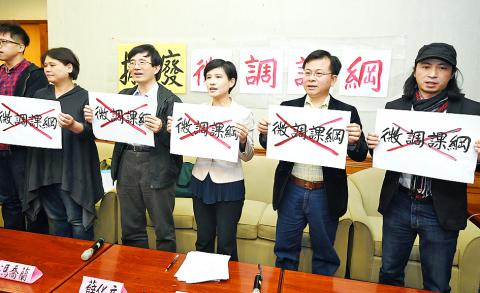President-elect Tsai Ing-wen (蔡英文) should set a timeline for and clarify the contents of planned changes to controversial high-school curriculum guidelines, as schools begin their textbook selection processes, civic groups said yesterday, adding that chaos could erupt if changes are announced after Tsai takes office on May 20.
Taiwan Grassroots Education Alliance member Chang Wen-lung (張文隆), a history teacher at New Taipei City Municipal San Min High School, said that Tsai should promise to withdraw the guidelines as soon as she is sworn in on May 20 to clear up possible confusion about her intentions.
“People have serious doubts about the educational policy of the new administration,” Chang said. “[Tsai’s] rhetoric has always been vague, saying that she would address the matter after the presidential election, so if she does not state her stance clearly, it would be unclear what she is hesitating over.”

Photo: Liao Chen-huei, Taipei Times
While Tsai has promised to withdraw the high-school social studies guidelines implemented last year, it is unclear whether the Chinese language and geography portions of the guidelines would be included along with history and civics, Chang said, adding that a timeline for the withdrawal is also unclear.
“We have no idea how long it would take to address history and civics, but if Tsai waits until after textbooks have been chosen and contracts have been signed, continued usage of the guidelines next year would be unavoidable,” he said, adding that while schools have some flexibility over when they choose textbooks, most decisions are made in April and May to allow paperwork to be processed before the summer break.
The Ministry of Education has allowed schools to choose textbooks based on both the old and new sets of guidelines, following controversy over what critics called “China-centric” revisions.
Cheng Chi-jui (鄭啟瑞), a history teacher at New Taipei Municipal Taishan Senior High School, said the continued use of both sets of guidelines doubled the burden of teaching graduates preparing for official exams.
“In addition to familiarizing themselves with the different textbook versions, [teaching graduates] must also keep track of which textbooks are based on the ‘old’ and ‘new’ guidelines, effectively doubling their workload,” he said.
Democratic Progressive Party Legislator Cheng Li-chun (鄭麗君) said that while her motion to order the withdrawal of the guidelines had garnered 65 signatures — more than a majority of national legislators — the Chinese Nationalist Party (KMT) used parliamentary procedures to delay a formal vote until next month by exercising its right to demand “cross-caucus negotiations.”
Cheng called for the ministry to immediately withdraw the guidelines on its own initiative, blasting ministry statements that any withdrawal would leave schools without direction.
The Chinese language and social studies components of curriculum guidelines were withdrawn after President Ma Ying-jeou (馬英九) took power in 2008, with the ministry simply ordering schools to follow an earlier set of guidelines, Cheng said.

SECURITY: As China is ‘reshaping’ Hong Kong’s population, Taiwan must raise the eligibility threshold for applications from Hong Kongers, Chiu Chui-cheng said When Hong Kong and Macau citizens apply for residency in Taiwan, it would be under a new category that includes a “national security observation period,” Mainland Affairs Council (MAC) Minister Chiu Chui-cheng (邱垂正) said yesterday. President William Lai (賴清德) on March 13 announced 17 strategies to counter China’s aggression toward Taiwan, including incorporating national security considerations into the review process for residency applications from Hong Kong and Macau citizens. The situation in Hong Kong is constantly changing, Chiu said to media yesterday on the sidelines of the Taipei Technology Run hosted by the Taipei Neihu Technology Park Development Association. With

CARROT AND STICK: While unrelenting in its military threats, China attracted nearly 40,000 Taiwanese to over 400 business events last year Nearly 40,000 Taiwanese last year joined industry events in China, such as conferences and trade fairs, supported by the Chinese government, a study showed yesterday, as Beijing ramps up a charm offensive toward Taipei alongside military pressure. China has long taken a carrot-and-stick approach to Taiwan, threatening it with the prospect of military action while reaching out to those it believes are amenable to Beijing’s point of view. Taiwanese security officials are wary of what they see as Beijing’s influence campaigns to sway public opinion after Taipei and Beijing gradually resumed travel links halted by the COVID-19 pandemic, but the scale of

A US Marine Corps regiment equipped with Naval Strike Missiles (NSM) is set to participate in the upcoming Balikatan 25 exercise in the Luzon Strait, marking the system’s first-ever deployment in the Philippines. US and Philippine officials have separately confirmed that the Navy Marine Expeditionary Ship Interdiction System (NMESIS) — the mobile launch platform for the Naval Strike Missile — would take part in the joint exercise. The missiles are being deployed to “a strategic first island chain chokepoint” in the waters between Taiwan proper and the Philippines, US-based Naval News reported. “The Luzon Strait and Bashi Channel represent a critical access

Pope Francis is be laid to rest on Saturday after lying in state for three days in St Peter’s Basilica, where the faithful are expected to flock to pay their respects to history’s first Latin American pontiff. The cardinals met yesterday in the Vatican’s synod hall to chart the next steps before a conclave begins to choose Francis’ successor, as condolences poured in from around the world. According to current norms, the conclave must begin between May 5 and 10. The cardinals set the funeral for Saturday at 10am in St Peter’s Square, to be celebrated by the dean of the College